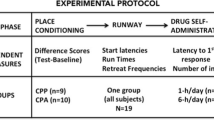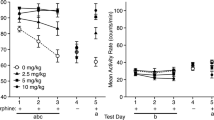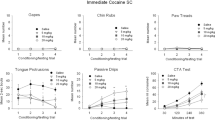Abstract
The role of predrug cues in tolerance to ethanol-induced hypothermia was investigated in two experiments. The results of Experiment 1 demonstrated that tolerance was displayed only when the drug was administered in conjunction with environmental stimuli that had, in the past, accompanied ethanol administration. A conditional hyperthermic response was elicited when a placebo, instead of ethanol, was administered in conjunction with the usual ethanol cues. Results of Experiment 2 suggested that tolerance to ethanol-induced hypothermia can be extinguished by repeated placebo injections. These results indicate that associative processes, previously demonstrated to modulate opiate tolerance, also modulate ethanol tolerance.
Similar content being viewed by others
References
Advokat C (1980) Evidence for conditioned tolerance of the tail-flick reflex. Behav Neur Biol 29:385–389
Cappell H, Poulos CX (1979) Associative factors in drug pretreatment effects on gustatory conditioning: cross-drug effects. Psychopharmacology 64:209–213
Cappell H, Roach C, Poulos CX (1980) Pavlovian control of cross-tolerance between pentobarbital and ethanol. Psychopharmacology (in press)
Hayes RL, Mayer DJ (1978) Morphine tolerance: Is there evidence for a conditioning model? Science 200:343–344
Hinson RE, Siegel S (1980) The contribution of Pavlovian conditioning to ethanol tolerance and dependence. In: Rigter H, Crabbe JC (eds) Alcohol tolerance, dependence, and addiction: A research handbook. Elsevier/North-Holland Biomedical Press, Amsterdam, pp 181–199
Kalant H (1973) Biological models of alcohol tolerance and physical dependence. In: Gross MM (ed) Alcohol intoxication and withdrawal: Experimental studies. Plenum, New York, pp 3–14
Lê AD, Poulos CX, Cappell H (1979) Conditioned tolerance to the hypothermic effect of ethyl alcohol. Science 206:1109–1110
Manning FJ (1976) Role of experience in acquisition and loss of tolerance to the effect of Δ 9-THC on spaced responding. Pharmacol Biochem Behav 5:269–273
Mansfield JG, Cunningham C (1980) Conditioned tolerance to the hypothermic effect of ethanol. J Comp Physiol Psychol 94:962–969
Pavlov IP (1927) Conditioned reflexes (Anrep GV, Trans). Oxford, London
Poulos CX, Cappell H (1979) An associative analysis of pretreatment effects in gustatory conditioning by amphetamine. Psychopharmacology 64:201–207
Siegel S (1975) Evidence from rats that morphine tolerance is a learned response. J Comp Physiol Psychol 89:498–506
Siegel S (1976) Morphine analgesic tolerance: its situation specificity supports a Pavlovian conditioning model. Science 193:323–325
Siegel S (1977a) Morphine tolerance acquisition as an associative process. J Exp Psychol [Anim. Behav.] 3:1–13
Siegel S (1977b) Learning and psychopharmacology. In: Jarvik ME (ed) Psychopharmacology in the practice of medicine. Appleton-Century Crofts, New York, pp 59–70
Siegel S (1978a) Tolerance to the hyperthermic effect of morphine in the rat is a learned response. J Comp Physiol Psychol 92:1137–1149
Siegel S (1978b) A Pavlovian conditioning analysis of morphine tolerance. In Krasnegor NA (ed) Behavioral tolerance: research and treatment implications. U.S. Department of Health, Eduction, and Welfare, Publication No. (ADM) 78-551, U. S. Government Printing Office, Washington, pp 27–53
Siegel S (1979) The role of conditioning in drug tolerance and addiction. In: Keehn JD (ed) Psychopathology in animals: research and treatment implications. Academic Press, New York, pp 143–168
Siegel S, Hinson RE, Krank MD (1978) The role of predrug signals in morphine analgesic tolerance: Support for a Pavlovian conditioning model of tolerance J Exp Psychol [Anim. Behav.] 4:188–196
Siegel S, Hinson RE, Krank MD (1979) Modulation of tolerance to the lethal effect of morphine by extinction. Behav Neur Biol 25:257–262
Siegel S, Sherman JE, Mitchell D (1980) Extinction of morphine analgesic tolerance. Learning Motivation 11:289–301
Wikler A (1973) Conditioning of successive adaptive responses to the initial effects of drugs. Cond Reflex 8:193–210
Author information
Authors and Affiliations
Rights and permissions
About this article
Cite this article
Crowell, C.R., Hinson, R.E. & Siegel, S. The role of conditional drug responses in tolerance to the hypothermic effects of ethanol. Psychopharmacology 73, 51–54 (1981). https://doi.org/10.1007/BF00431101
Received:
Accepted:
Issue Date:
DOI: https://doi.org/10.1007/BF00431101




